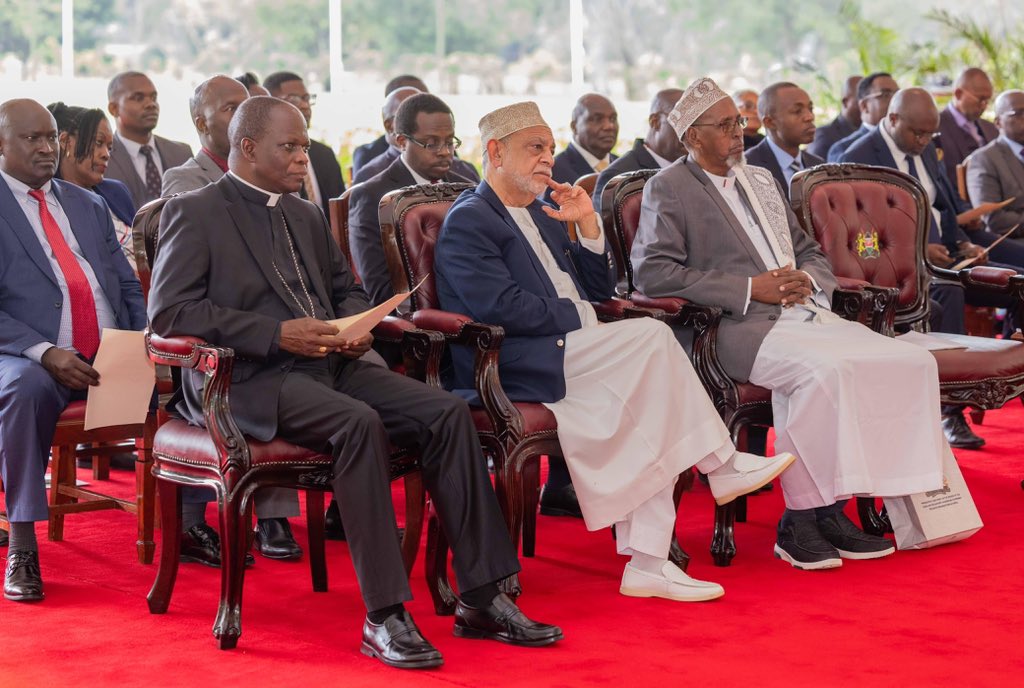By Paschal Norbert
NAIROBI, AUGUST 2, 2024 (CISA) – President William Ruto has received recommendations from the Taskforce on the Review of the Legal and Regulatory Framework Governing Religious Organizations in Kenya, which proposes a series of legislations aimed at curbing religious exploitation.
This taskforce, constituted by President Ruto on May 5, 2023, in response to the Shakahola Tragedy, sought to address the emergence of extremist religious organizations and similar groups that have inflicted harm on the people and also review the legal and regulatory framework governing religious organizations in Kenya.
The taskforce, which submitted its report on July 30 was chaired by Rev Mutava Musyimi, former Secretary General of the National Council of Churches of Kenya (NCCK) and ex-Mbeere South MP. Archbishop Maurice Muhatia Makumba of Kisumu, who is the chairperson of the Kenya Conference of Catholic Bishops (KCCB) was also a member of the taskforce alongside Catholic lawyer Charles Kanjama, who is also the chairperson of the Kenya Christian Professionals Forum (KCPF).
Other members of the taskforce include Bishop Mark Kariuki, Bishop (Dr) Eli Rop, Judy Thongori, Rev (Dr) Alphonse Kanga, Bishop Philip Kitoto, Dr Faridun Abdalla, Prof Musili Wambua, Joseph Khalende Wabwire, Mary Awour Kitegi, Leah Kasera, Nancy Murega, and Wilson Wanyanga. Together, they were tasked with identifying and addressing legal, institutional, and governance gaps that permit or may permit religious extremist groups to engage in harmful practices.
What the bill proposes:
Proposed Legislation to Curb Religious Exploitation
Any religious leader who falsely performs miracles, healings, or blessings to extort unsuspecting Kenyans will face severe penalties if the recommendations of President William Ruto’s task force are adopted.
Tough Penalties for Financial Exploitation
The proposed legislation includes stringent measures to address fraudulent practices. Religious leaders who deceive their congregations into giving money for ‘financial favour from God’ will face a fine of KES 5 million, up to ten years in prison, or both.
“A religious leader who by means of any false and fraudulent representations, tricks or schemes as to healing, miracles, blessings or prayers, extorts or fraudulently obtains any financial gain or material benefit from any person or induces the person to deliver money or property to the religious leader commits an offence and is liable on conviction to a fine not exceeding Ksh.5 million or to imprisonment for a term not exceeding ten years or to both,” the bill states.
Measures against Coercion and Intimidation
The bill also addresses coercive practices. Religious leaders who use force, threats, or intimidation to compel individuals to join their religion will be fined up to KES 1 million or face a three-year prison term, or both. Parents will retain the right to determine the religious upbringing of their children.
Restrictions on Political Engagement
Under the proposed regulations, religious institutions will be prohibited from engaging in politics or organizing debates to support political candidates. Violations could result in a fine of up to KES 500,000 or six months in prison, or both.
Annual Reporting and Oversight
The task force, led by former NCCK Secretary-General Dr Mutava Musyimi, was established in response to the Shakahola tragedy, which saw over 400 bodies exhumed from the forest linked to Pastor Paul Mackenzie. The draft Religious Organizations Bill 2024, mandates that all churches and religious organizations submit annual financial returns to the government. The bill proposes the establishment of the Religious Affairs Commission, which will oversee religious matters and require institutions to furnish financial returns, accounts, and member registers.
Institutions failing to file annual returns will face suspension for up to six months.
“Any religious institution which files its returns out of time shall pay such penalty for late filing as may be prescribed,” the draft law reads.
Transparency and Compliance
The proposed regulations ensure that the accounts and member registers of religious institutions are open to inspection by the commission or authorized individuals. Obstructing such inspections could result in a fine of up to KES 100,000 or a year in prison, or both.
Role of the Religious Affairs Commission
The Religious Affairs Commission will be responsible for registering religious organizations, overseeing compliance, and developing policies and codes of conduct. It will also educate the public on religious tolerance and extremism. The commission will comprise a chairperson appointed by the President, the attorney general or their representative, and various nominees from religious organizations.
“The chairperson and every member… shall hold office for a period of three years and shall be eligible for re-appointment for a further and final term of three years,” the draft law specifies.
This comprehensive draft bill aims to bring greater oversight and regulation to Kenya’s religious sector, addressing issues of exploitation, coercion, and political involvement.
